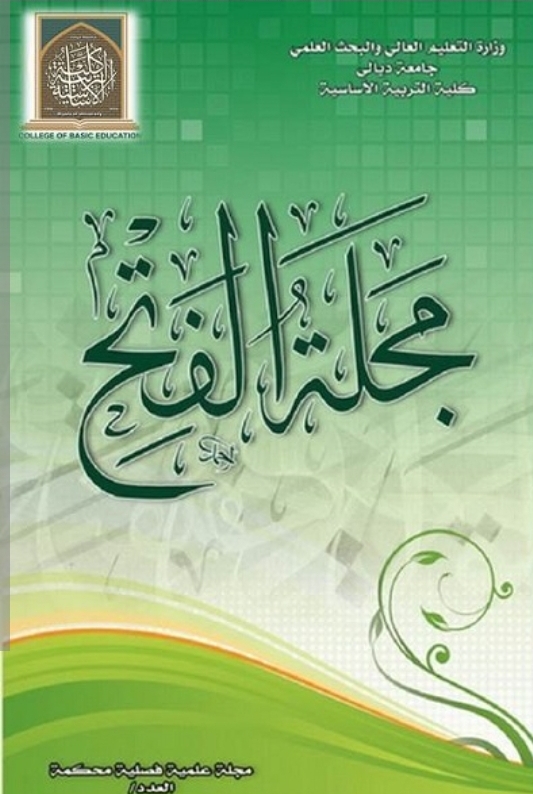The impact of the cognitive acceleration strategy on the achievement of second grade intermediate female students in geography and the development of their scientific thinking
DOI:
https://doi.org/10.23813/FA/24/1/3Keywords:
Keyword : cognitive acceleration strategyAbstract
The aim of the present research is to investigate the impact of the cognitive acceleration strategy on the achievement of second grade intermediate students and the development of their scientific thinking. To achieve the goal of the research has been formulated three null hypotheses, the experimental method was chosen with two sets of equivalence and post-test for achievement and tests before and after scientific thinking, applied research experiment in the first semester of the academic year (2019-2018). The research sample consisted of (61) students (31) for the experimental group and (30) for the control group, which were randomly selected. The research groups were rewarded with the following variables (the age of the students calculated in months, intelligence, scale of scientific thinking, the level of educational attainment of the parents). Prepared behavioral purposes for the scientific material, which consisted in its final form of (90) behavioral objectives, and in the light of these objectives were prepared (50) teaching plans after confirming its validity to be presented to a group of experts and arbitrators. The researcher prepared two tools for research, the achievement test and the scientific thinking scale, the achievement test consisted of (40) thematic paragraphs of the multiple-choice type with four alternatives. Alpha-Kronbach (0.95) The scale of scientific thinking consisted of (5) skills (identifying the problem, choosing the hypotheses, testing the validity of the hypotheses, interpretation, generalization), and distributed paragraphs to the skills mentioned equally (five paragraphs per skill) four Alternatives, have been updated Validity and psychometric properties were found, and the stability of its paragraphs was found in alpha-Kronbach method (0.88) .After data processing statistically and using statistical bag, the results of the research showed:
1-There is a statistically significant difference at the significance level (0.05) between the average scores of the experimental group studying according to the cognitive acceleration strategy and the scores of the control group students who are studying according to the usual method of achievement test in the geography in favor of the average experimental group.
2- There is a statistically significant difference at the level of significance (0.05) between the average scores of the experimental group students who study according to the cognitive acceleration strategy and the scores of the control group students who study according to the usual method in the scientific thinking scale in favor of the average of the experimental group.
3-There is a statistically significant difference at the level of significance (0.05) between the average scores of students of the experimental group studying according to the strategy of cognitive acceleration before and after the experiment in the scale of scientific thinking in favor of the post-median.
Based on these results, the researcher developed a number of conclusions and recommendations and suggested further studies to complement the research.
References
بل, فريدريك ﻫ. (1986): طرق تدريس الرياضيات, ترجمة محمد أمين المفتي وممدوح محمد سليمان, ط2, الدار العربية للنشر والتوزيع, القاهرة.
رزوقي، رعد مهدي وسهى أبراهيم (2015) : التفكير وأنماطه (التفكير العلمي ,التفكير التأملي , التفكير الناقد , التفكير المنطقي ),ج1 ,ط1 , دار المسيرة , عمان .
زيتون,عايش محمود (2001 ) , أساليب تدريس العلوم ، ط1، دار الشروق ، الإصدار (4) , عمان ,الأردن.
عفانة ، عزو ويوسف الجيش (2009) : التدريس والتعليم بالدماغ ذي الجانبين ، دار الثقافة ، عمان .
عمور,عمر عيسى (2009),التجربة العلمية وتنمية التفكير العلمي,دار المناهج للنشر والتوزيع, عمان, الاردن
العوادي ,محمد عباس (2014) اثر استراتيجية التسريع المعرفي في تحصيل مادة علم الاحياء ومهارات ما وراء المعرفة لطلاب الصف الرابع العلمي ، رسالة ماجستير غير منشورة , جامعة بغداد , كلية التربية ابن الهيثم .
عياش ، امال نجاتي وعبد الحليم محمود الصافي (2007) : طرق تدريس العلوم للمرحلة الاساسية ، الطبعة الاولى ، دار الفكر للنشر والتوزيع ، عمان .
غباري ، ثائر أحمد وخالد محمد أبو شعيرة (2011) :أساسيات في التفكير ،ط1، مكتبة المجتمع العربي ،عمان .
الموسوي,زهراء رؤوف (2008), اثر أنموذجين من دورة التعلم في تحصيل طالبات الصف الثاني المتوسط في مادة الكيمياء وتفكيرهن العلمي, رسالة ماجستير غير منشورة,كلية التربية ابن الهيثم , جامعة بغداد.
Ackerman, F. &Eden, C (2007). Contrasting single user and networked group decision support systems for strategy makink, Group Decision and Negotiation,
Adey, ph & Shayer, M. (1994): "accelerating the Development of Formal Thinking in Middle and High School Students Iv: Three years after a two year Intervention", journal of Research in Science Teaching, Vol. (30), No. (4), pp 351-366 .
Breyfogle, M. Lynn and Herbel-Eisenmann, Beth A. (2000). Focusing of Students' Mathematical Thinking. Mathematics Teacher, 97(4), 244-247.
Coben, Diana. (2002). Adults` Mathematical Thinking and Emotions. Studies in the Education of Adults, 34(1), 88-91.
Good , C.V. , (1973) , Dictionary of Education , McGraw-Hall Book Co ., New York .
Greenwood, Jonathan Jay. (1993). On the Nature of Teaching and Assessing Mathematical Power and Mathematical Thinking. Arithmetic Teacher, 41(3), 144-152.
Sfard، Anna. (2001). There is More to Discourse than Meets the Ears. Looking at Thinking as Communicating to Learn More about Mathematical Learning. Educational Studies in Mathematics, 46(1-3), 13-57.
Downloads
Published
How to Cite
Issue
Section
License
Copyright (c) 2023 فاضل عبد الحسن فاضل

This work is licensed under a Creative Commons Attribution 4.0 International License.
حقوق النشر والترخيص
تطبق مجلة الفتح للبحوث التربوية والنفسية ترخيص CC BY (ترخيص Creative Commons Attribution 4.0 International). يسمح هذا الترخيص للمؤلفين بالاحتفاظ بملكية حقوق الطبع والنشر لأوراقهم. لكن هذا الترخيص يسمح لأي مستخدم بتنزيل المقالة وطباعتها واستخراجها وإعادة استخدامها وأرشفتها وتوزيعها ، طالما تم منح الائتمان المناسب للمؤلفين ومصدر العمل. يضمن الترخيص أن المقالة ستكون متاحة على نطاق واسع بقدر الإمكان وأن المقالة يمكن تضمينها في أي أرشيف علمي.
لمزيد من المعلومات، يرجى متابعة الرابط: https://creativecommons.org/licenses/by/4.0/.



